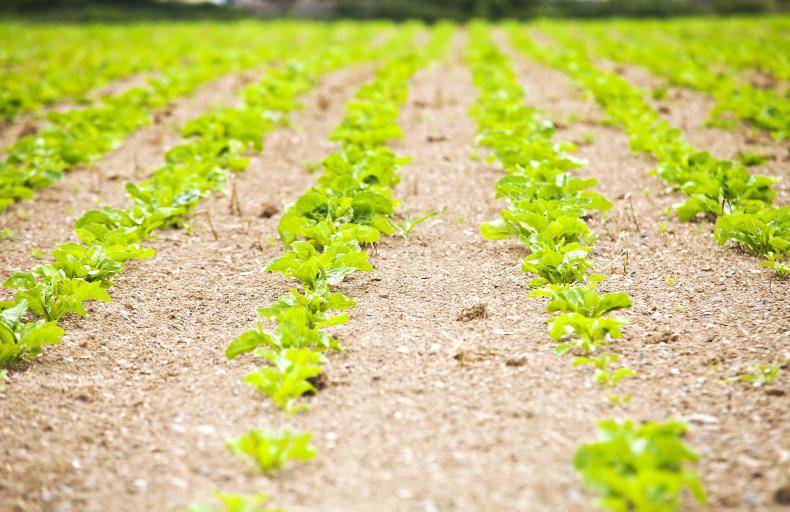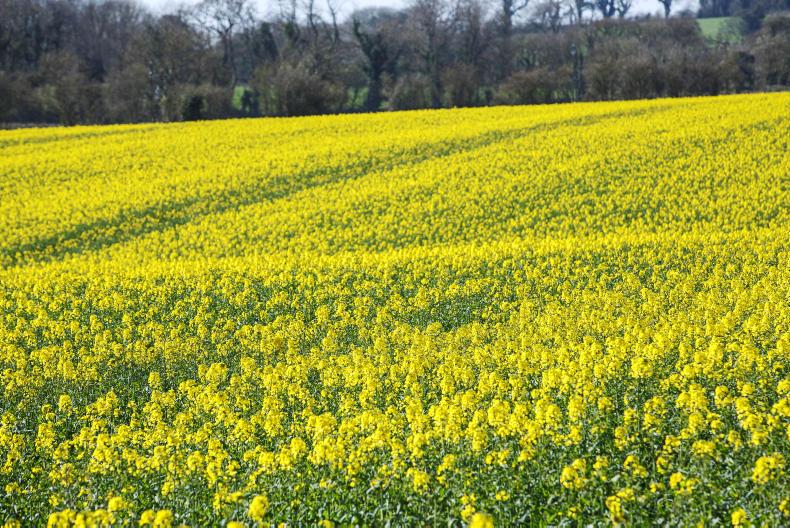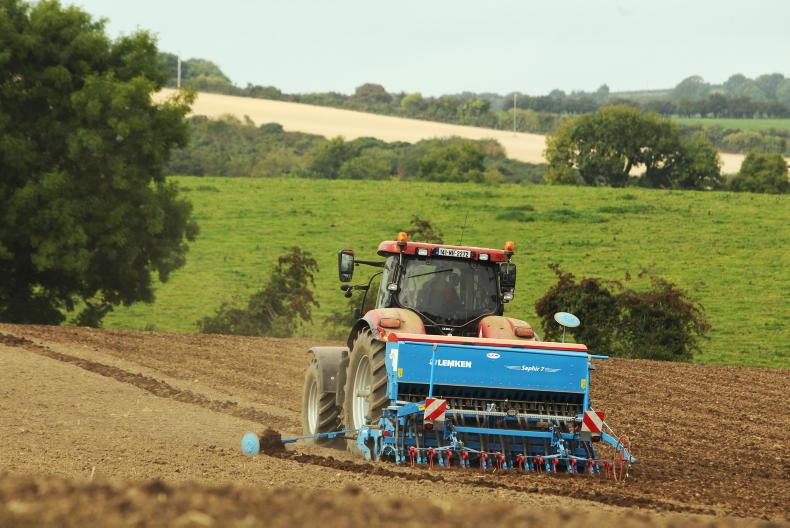Spring weather pressures continue to take their toll on tillage farms and combinable crop options for 2018 are becoming increasingly limited.
While many growers have opted out of planting spring beans and spring wheat this year, there were still small areas of these crops sown this week. Spring oats and spring oilseed rape are still options, but spring barley looks to be the replacement crop of choice where greening allows.
Three-crop rule
On Wednesday last, the European Commissioner for Agriculture Phil Hogan confirmed that he will propose a derogation from the three-crop rule for Irish farmers. However the decision is yet to be made and is subject to approval by the Commission.
Hogan has stated that a derogation is the only effective support that can be provided in light of the exceptional levels of rainfall. This would indicate that a derogation is likely, but until such time as this is confirmed the three-crop rule remains in place.
Forage crops
Unfolding events this spring present an opportunity to produce forage crops for the livestock sector. Crops such as beet, maize and grass silage will be in demand in order to replenish forage stocks.
Both sugar and fodder varieties continue to be the most profitable break crop on Irish farms. Growing forage crops may also help spread the workload, as well as deliver benefits to the rotation.
However, securing a market is crucial before planting any forage crop for sale. Arrangements need to be put in place to ensure delivery and payment for fodder. Teagasc’s Michael Hennessy recommends having a payment plan in place to cover the costs of growing the forage crop plus a production margin. The agreement should consider staged payments through the summer and a final settlement when the forage is delivered. Other options might be considered also.
Cropping options
This year, growers may choose to grow crops which, under normal circumstances, wouldn’t have been considered. However given the way in which the spring has unfolded, these crops must now considered as a viable option.
Spring beans: Beans which are planted from now on run the risk of lower yields and a very late harvest. Little research has been done in Ireland into the ensilability of beans so growers may be taking a risk if they chose to do this.
Spring cereals: While it is considered too late for spring wheat and beyond the optimum planting time for spring oats, some growers will still be planting these crops. Spring barley, for most, is now the first choice of spring cereal this year but seed availability and greening obligations may limit the planted area.
Spring oilseed rape (SOSR): SOSR is a viable replacement for spring beans as a break crop. It is suitable for sowing in April and is relatively low input. However, the profitability of SOSR has been low in recent years. 
SOSR is a viable replacement for spring beans as a break crop. It is suitable for sowing in April and is relatively low input.Fodder beet: Both sugar and fodder varieties continue to be the most profitable break crop on Irish farms. This spring has proved no different with high demand and strong prices reported around the country.
Maize: With strong demand for maize ground reported around the country this spring, planting the crop remains a viable option for growers. Despite the late spring, most crops will still require a plastic cover.
Whole crop: Whole cropping spring crops such as barley, oats, wheat, rye or triticale is an option for growers and eliminates issues with harvest date. Crimping these crops may also be an option.
Forage cover crop: Establishing forage crops with the intention of letting stock graze them at a later stage is an option but grazing infrastructure is likely to be an issue.
Temporary reseed: Temporary reseeding fields with a fast growing annual species of grass such Westerwolds ryegrass, will produce a number of crops of silage this year. Care should be taken not to let the crop go to seed however.
Fallow: For growers who are really under pressure with planting opportunities, fallow is another real option for growers this spring. Arable fallow must be crop free (other than grass) between 1 January to 31 July. Fallow will count towards growers EFA obligations and it is considered a crop for BPS applications.
Read more
Three-crop rule derogation on the cards
Break crops show big bottom-line differences
Spring weather pressures continue to take their toll on tillage farms and combinable crop options for 2018 are becoming increasingly limited.
While many growers have opted out of planting spring beans and spring wheat this year, there were still small areas of these crops sown this week. Spring oats and spring oilseed rape are still options, but spring barley looks to be the replacement crop of choice where greening allows.
Three-crop rule
On Wednesday last, the European Commissioner for Agriculture Phil Hogan confirmed that he will propose a derogation from the three-crop rule for Irish farmers. However the decision is yet to be made and is subject to approval by the Commission.
Hogan has stated that a derogation is the only effective support that can be provided in light of the exceptional levels of rainfall. This would indicate that a derogation is likely, but until such time as this is confirmed the three-crop rule remains in place.
Forage crops
Unfolding events this spring present an opportunity to produce forage crops for the livestock sector. Crops such as beet, maize and grass silage will be in demand in order to replenish forage stocks.
Both sugar and fodder varieties continue to be the most profitable break crop on Irish farms. Growing forage crops may also help spread the workload, as well as deliver benefits to the rotation.
However, securing a market is crucial before planting any forage crop for sale. Arrangements need to be put in place to ensure delivery and payment for fodder. Teagasc’s Michael Hennessy recommends having a payment plan in place to cover the costs of growing the forage crop plus a production margin. The agreement should consider staged payments through the summer and a final settlement when the forage is delivered. Other options might be considered also.
Cropping options
This year, growers may choose to grow crops which, under normal circumstances, wouldn’t have been considered. However given the way in which the spring has unfolded, these crops must now considered as a viable option.
Spring beans: Beans which are planted from now on run the risk of lower yields and a very late harvest. Little research has been done in Ireland into the ensilability of beans so growers may be taking a risk if they chose to do this.
Spring cereals: While it is considered too late for spring wheat and beyond the optimum planting time for spring oats, some growers will still be planting these crops. Spring barley, for most, is now the first choice of spring cereal this year but seed availability and greening obligations may limit the planted area.
Spring oilseed rape (SOSR): SOSR is a viable replacement for spring beans as a break crop. It is suitable for sowing in April and is relatively low input. However, the profitability of SOSR has been low in recent years. 
SOSR is a viable replacement for spring beans as a break crop. It is suitable for sowing in April and is relatively low input.Fodder beet: Both sugar and fodder varieties continue to be the most profitable break crop on Irish farms. This spring has proved no different with high demand and strong prices reported around the country.
Maize: With strong demand for maize ground reported around the country this spring, planting the crop remains a viable option for growers. Despite the late spring, most crops will still require a plastic cover.
Whole crop: Whole cropping spring crops such as barley, oats, wheat, rye or triticale is an option for growers and eliminates issues with harvest date. Crimping these crops may also be an option.
Forage cover crop: Establishing forage crops with the intention of letting stock graze them at a later stage is an option but grazing infrastructure is likely to be an issue.
Temporary reseed: Temporary reseeding fields with a fast growing annual species of grass such Westerwolds ryegrass, will produce a number of crops of silage this year. Care should be taken not to let the crop go to seed however.
Fallow: For growers who are really under pressure with planting opportunities, fallow is another real option for growers this spring. Arable fallow must be crop free (other than grass) between 1 January to 31 July. Fallow will count towards growers EFA obligations and it is considered a crop for BPS applications.
Read more
Three-crop rule derogation on the cards
Break crops show big bottom-line differences








 This is a subscriber-only article
This is a subscriber-only article















SHARING OPTIONS: